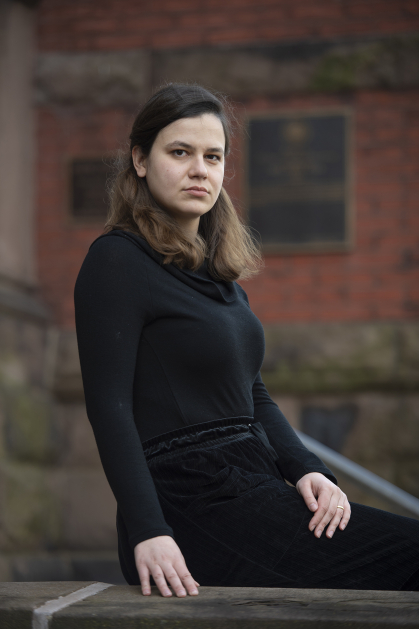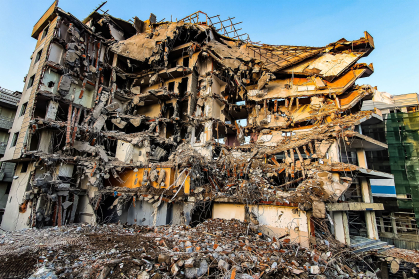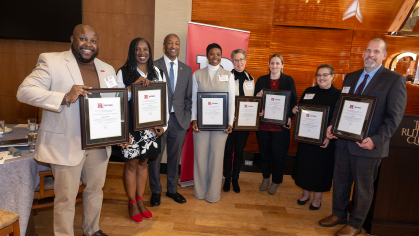Rutgers Community Joins Together to Support Turkey and Syria Earthquake Victims

Marking one month since the devastating 7.8 magnitude earthquake destroyed parts of Turkey (also known as Türkiye) and Syria, Rutgers students, faculty and staff are planning a vigil in honor of the more than 50,000 killed and 70,000 injured and to call attention to the ongoing crisis.
The vigil is scheduled from 5 p.m. to 6:30 p.m. on Sunday in The Yard at College Avenue as Rutgers joins universities across the country that have held events since the Feb. 6 earthquake.
“The vigil marks the first month since the disaster, and is in remembrance of all the victims that lost their lives to show that they are in our hearts, even if they are thousands of miles away,” said Muhammed Keskin, a senior finance major at Rutgers Business School-Newark and New Brunswick and treasurer of the Turkish Club.
Over the past month, the Turkish and Syrian communities at Rutgers have been working tirelessly to collect needed items to send to the region where the death toll is estimated to rise, raise money for earthquake victims, inform the community about ongoing disaster relief efforts and provide support in whatever way possible.
‘’This is a trauma in every way imaginable that will affect us for decades,” said Onur Bilgen, an associate professor in the School of Engineering, who is leading efforts to organize the vigil and various activities. “At the vigil marking the first month, we want to provide a glimpse of what happened and share the scope of many unrecoverable losses. We want to support each other and to support those we are not aware of in our communities – this includes Turkish, international and American friends who were impacted by natural disasters. We want to inform the community regarding our ongoing disaster relief efforts, and to direct attention to governmental and non-governmental aid drives and organizations.’’
Students and faculty have organized donation drives, collected clothing and personal items and held bake sales at all three Rutgers-New Brunswick campuses, raising over $5,000 in just three days. They also collected large bags of clothing that have been sent on cargo planes to Turkey and Syria. Others have collected blankets, baby formula, sleeping bags and handwarmers.
Rutgers President Jonathan Holloway, who has sent messages to students from Turkey and Syria, said he is heartened by the community efforts underway.
“We are a scholarly community enriched by the presence of students and scholars from around the world, and when such a tragedy occurs, we all share in their pain and anguish,” Holloway said.
Some members of the Rutgers community including Dinemis Kip, a student in the Graduate School of Applied and Professional Psychology, have family and friends directly affected by the earthquake and have spent the last month looking for ways to help.
Kip’s mother and grandparents, who lived in Kahramanmaraş, at the epicenter of the quake, were in their homes asleep when the earth started to shake at 4:17 a.m. (8:17 p.m. in New Jersey.)
“As soon as I heard about the earthquake, I tried to contact family and friends and couldn’t reach anyone for hours,” said Kip, who left Turkey a year ago to study here in the United States. “When I finally reached my mother, I heard such panic in her voice. It was freezing, there was snow in the street and she had to live out there for a day before we found a place for her and my grandparents to go.”
People in the destruction zone – in southern Turkey and northern Syria where thousands of buildings and homes were destroyed – are struggling, living with the psychological impact of the devastating earthquake, Kip said.

Senanur Senturk, a Rutgers Business School senior, was born in Turkey and came here as a child with her parents and sister. Although grandparents, aunts, uncles and cousins live on the western side of Turkey, about 620 miles away, she said, everyone in the community joined together to locate friends and family after the earthquake.
“So many people just jumped into their cars and drove hundreds of miles to the area to try and find relatives. So many saved families themselves,” she said.
Senturk, who lives in Cliffside Park in Bergen County, which has a big Turkish community, at first donated money, then helped collect clothing and other items, bagging them so they could be sent. She also sent about 25 whistles to relatives after she read that people in the earthquake zone should have life-saving backpacks close to their beds, that also include water bottles and protein bars.
Selin Bengi Gumrukcu, a lecturer in the political science department in the School of Arts and Sciences at Rutgers-New Brunswick, has family in Izmir, the third most populated city in Turkey, which is outside the earthquake zone. But some of her friends and former students were in the epicenter.
"My one friend who lives in Gaziantep texted me and said ‘“we are outside now; the situation is bad, please pray for us/the region,'" Gumrukcu said.
She and others in the Turkish and Syrian community say since rebuilding is going to take years, financial assistance is key and humanitarian support is essential. This is why vigils like the one scheduled at Rutgers are important. Gumrukcu has donated to several organizations, started two Go Fund Me pages – one on her own and a joint one with three other political scientists in other states – to support Turkish Philanthropy Funds based in New York City and nonprofit organizations in Turkey.
“Schools, hospitals, other public offices, houses, farms, airports, all need to be rebuilt,” she said. “The international community should keep helping.”


